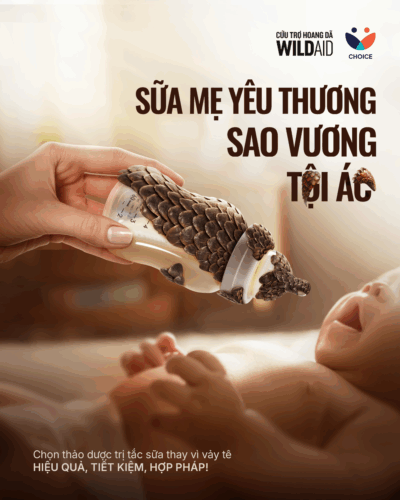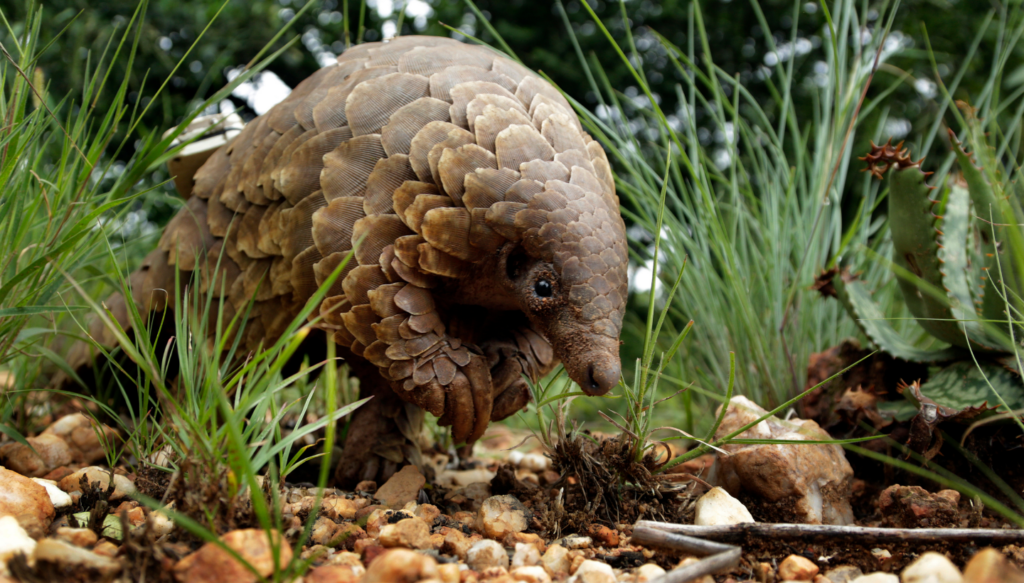
One might mistake a startled pangolin for a reptile, or even a distant relative of an armored dinosaur. But the scaly creature is actually a small mammal, most closely related to carnivores like cats and dogs, a lineage it diverged from nearly 80 million years ago.
Native to Africa and Asia, the pangolin plays a vital role in their ecosystems. They feed almost exclusively on ants and termites, consuming up to 70 million insects each year. With tongues that can stretch up to 28 inches, pangolins act as nature’s pest controllers and soil aerators, quietly maintaining the delicate balance that allows plants and animals to thrive.
When threatened, a pangolin curls into a ball, tucking in its head and shielding itself with overlapping brown scales made of keratin — the same substance found in human hair and nails. This natural armor is an excellent defense against predators in the wild. Against humans, however, these scales offer little protection. Pangolins are the world’s most trafficked wild mammal, facing relentless threats from poaching for meat and the demand for their scales in Traditional Chinese Medicine (TCM). Up to 200,000 pangolins are taken from the wild each year.
But change is happening. For instance, the Coalition for Wildlife Protection in TCM is a growing global community of TCM professionals committed to protecting biodiversity by rejecting the use of endangered species in medicine. Vietnam, one of the top destinations for pangolin products, recently became the first country to establish a national chapter of the Coalition, uniting practitioners committed to identifying and embracing effective plant-based substitutes for animal-derived ingredients.
The Pangolin Milk Bottle Project
To further encourage behavior change in Vietnam, WildAid, in partnership with the Coalition for Wildlife Protection in TCM, Choice, and Dinosaur Vietnam, launched the Pangolin Milk Bottle Project on Vietnamese Women’s Day, October 20, 2025. The aim: to end the practice of treating blocked milk ducts with pangolin scales.
The campaign features a public service announcement showing a mother in pain as she listens to her baby cry. Desperate for relief, she turns to a remedy in her medicine cabinet, but drops the breast pump in shock when it becomes coated in scales. The video is featured alongside a dedicated page with a similarly scale-covered milk bottle, facts about pangolins and their endangered status, and a pledge to stop using their scales to treat blocked milk ducts. The page also introduces six herbal alternatives, as well as non-herbal remedies such as massage, warm and cool compresses, and frequent breastfeeding.
Miss Universe Vietnam H’Hen Niê, one of the campaign’s ambassadors shared, “Since having a child, I understand that everyone wishes to give their child the best. But true love is when we choose a way to care for our child that does not harm other lives. I believe that Vietnamese mothers will be the pioneers in spreading this compassionate message.”


Why it matters
In Vietnam, pangolin scales are currently ranked fifth among the 20 most common methods used to treat blocked milk ducts. A 2023 study conducted by WildAid and Choice in Vietnam, revealed that nearly 50% of traditional medicine practitioners in Hue still believe pangolin scales are effective in treating mammary duct obstruction — even though 83% admitted this practice violates the law. These findings reveal how enduring traditional beliefs continue to fuel demand, making it harder to protect pangolins in Vietnam and around the world.
Hope for the future
Encouragingly, a second study found that 85% of practitioners are willing to use substitutes in place of wildlife products — a hopeful sign that change is within reach.
Continued awareness and demand reduction efforts can make a real difference, and the Pangolin Milk Bottle Project aims to shift perceptions and inspire compassionate choices through creative, community-level outreach.
Together, we can change minds — and save pangolins.
Stay in touch and get the latest WildAid updates.
SIGN UP